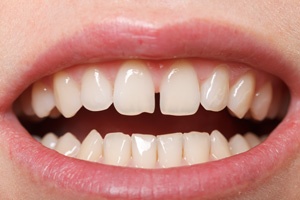Teeth Gap
 Are any of your teeth further apart than your others? Some people are concerned that having a wide gap between your teeth might make them more susceptible to tooth decay and similar problems. If this is a concern for you, our Bellevue dentist office has everything you need to know.
Are any of your teeth further apart than your others? Some people are concerned that having a wide gap between your teeth might make them more susceptible to tooth decay and similar problems. If this is a concern for you, our Bellevue dentist office has everything you need to know.
The good news is that a wide gap between two teeth does not make it more likely that you will experience tooth decay. In fact, since it is easier to clean between two teeth that are a little further apart than normal, you may actually be less likely to get a cavity on the side of your tooth. It is when two teeth are particularly close together that you may have a problem, as it can be difficult to get floss in far enough to properly clean between your teeth.
Your real concern should be about the strength of your teeth. When some of your teeth have wider gaps between them than others, at least some of your teeth are probably crooked. This means that your bite is weaker, and you may be in need of braces or similar corrective dental work.
Call our Bellevue dentist if you have any questions or want a consultation for further professional dental advice.
